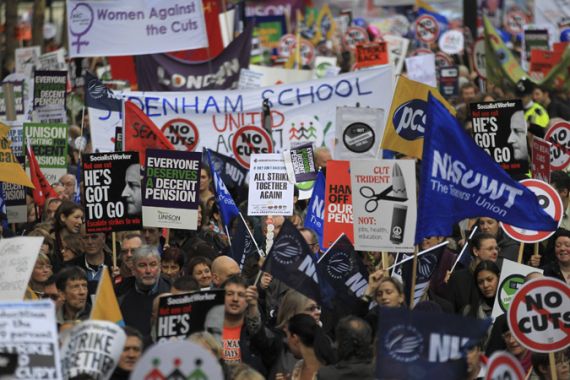Huge public-sector strike hits the UK
Many schools and hospitals closed as workers take to the streets in protest against changes to their pensions.

British public-sector workers opposed to government pension cuts are on a 24-hour strike, which organisers say is the biggest walkout in a generation.
Two thirds of state were shut for one day, while many hospital operations have been cancelled along with courts and government offices.
Keep reading
list of 4 itemsBoeing hit with 32 whistleblower claims, as dead worker’s case reviewed
US imposes new sanctions on Iran after attack on Israel
A flash flood and a quiet sale highlight India’s Sikkim’s hydro problems
Angry over a pension overhaul, which they say will require them to work longer before receiving a pension and contribute higher amounts each month to the account, organisers says as many as two million people have stayed stay away from work.
Prime Minister David Cameron played down the impact of Wednesday’s strike, calling it “something of a damp squib”.
Cameron said 40 per cent of schools were open and the main London airports were working properly.
Union anger has been fuelled by new curbs on public sector pay and hundreds of thousands of additional job
cuts.
The measures were outlined on Tuesday when the Conservative-led coalition government cut economic growth forecasts and said its tough austerity programme would last until 2017.
The government says Wednesday’s strike could cost the nation up to $800m.
Brendan Barber, the General Secretary of the Trade Union Congress, defended the strikes, telling Al Jazeera: “It is the poorest and the weakest who are too often being asked to pay for the crisis and not the elite who caused the crisis.”
Work as usual
Fears of long delays at London’s main Heathrow airport proved unfounded after the government flew home embassy staff to help out and recruited volunteers from other departments to carry out passport checks.
|
Al Jazeera’s Lawrence Lee speaks two public sector staff who are on the 24-hour strike. |
However, underground rail services were not running in Scotland and there were no trains or buses in Northern Ireland.
A UK Border Agency spokesperson said: “Early signs show our contingency plans are minimising the impact of strike action, but waiting times at some ports may still be slightly longer than normal.”
The Immigration Services Union says 80 per cent to 90 per cent of staff are striking, with 22 out of 23 workers at Calais port not showing up for work and, as far as they are aware, none of their members working at Heathrow.
The government, trying to turn around a debt-laden economy teetering on the brink of recession, says reform is needed as people are living longer and public service pensions are unaffordable.
The strikes mirror protests in other European countries where governments are trying to juggle budget deficits with the needs of an ageing population.